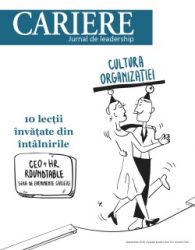Corporate Christmas Story

End of year decisions are tricky for general management. Each company has its own policies on end of year remuneration for its employees (annual bonuses, Christmas bonuses, parties, presents etc.). All these depend on corporate company culture, country of origin, independence of local subsidiaries etc.
As Romania moves away from a collective organisation culture in which individual / team / company performance is not rewarded, but rather loyalty, length in the workplace or celebration of national holidays, general management teams will continue to decide on which model works most efficiently in rewarding and motivating employees. The majority of employers who continue to reward their employees with non-performance related Christmas bonuses are often state-owned, recently privatised, recently acquired by a multinational, or undergoing organisational change. The act of offering employees a Christmas bonus or present not related to performance can be construed as a gesture with multiple meanings: “generosity” of the organisation, the employer “taking care” of its employees, a paternalistic attitude. But this has no effect on increasing individual responsibility and does not retain employees in the long-term. Multinationals or large private businesses, on the other hand, tend to offer end-of-year performance-related bonuses which are intended to motivate individuals and team, increase loyalty to employer, therefore ensuring business continuity and stability for the years ahead.
With or without presents?
The reason for this clarification is that the former situation leads to difficulties when policies are not implemented consistently, and are at the discretion of general management. If an employer has usually offered Christmas presents to its employees, but in 2010 decides not to do so, then this decision is open to wider interpretation and misinterpretation, as it is not transparently or directly linked to individual / team / company performance. This misinterpretation can cause a fair amount of damage to an organisation if not handled with care and in a timely manner.
Performance-related bonuses, however, reduce the potential for misinterpretation, as if one does not hit one’s target then it is that individual’s (or team’s) responsibility, and not due to lack of fairness or transparency.
Respect is the key
Some quick analysis of the UK market has shown that many companies are forfeiting their Christmas party this year, or are using the money to put towards performance / company bonuses, or not paying out bonuses at all, depending on each company’s end-of-year financial results.
On the Romanian market, companies may be forced to forfeit their party, hold back on bonuses or cut them completely, or may still be in a situation in which salary cuts are being maintained over the Christmas period.
An example of a letter of recognition:
Andrei,
I want you to know how much I appreciate your work. We all know this has been a tough year, but despite this you kept your spirits up and have continued to be a real team player.
Keep up the good work and thank you for all your help!
Regards,
Delia
If an employer is faced with this situation, the following must be taken into consideration. Firstly, financial decisions such as these must be well reasoned and calculated. If there is no logic or data to support a decision then this decision will be difficult for an employee to swallow. Secondly, no matter how large an organisation is, any change to the norm, or reneging on a commitment, needs to be communicated in a transparent, logical, sensitive and timely manner to its employees, as this is the most important way of maintaining an informed, motivated and capable team of professionals. In fact, it is simple respect for the people who are responsible for a company’s profit and making its shareholders and directors happy.
If an employer takes these two steps in communicating the fact that the company is in financial difficulty and there is a valid reason why it cannot commit to paying our bonuses, then damage is mitigated.
Feed forward
Employers should also take into consideration the great effects of public positive feedback and feed forward. It is well known that feedback sessions or comments are often focused on the negative, or can be misconstrued as negative by the receiver, while feed forward really sympathises with the employee and tries to connect with him differently and frame the discussion in a positive manner. For example, when giving feedback, a manager may tend to say “You did this using this and that was good/wrong” but feed forward would focus on the positive intent of the employee, i.e. “I understand why you did this, I know what you used and you came up with best results, but perhaps you might consider also trying these other different approaches in the future”. Feed forward creates a connection at a different level which is very important for the employee: he will acknowledge the fact that his results and behaviour are not just analysed but also understood. This type of interaction may help maintain individual motivation during difficult economic times.
Tools for managers
Hard economic times force employers to confront and understand what really motivates their employees. To their surprise they might find that transparent communication, a constant level of relevant support, constructive criticism, and recognition of results generally outweigh financial compensation
Public recognition of employees efforts: employees enjoy receiving public confirmation and appreciation of their work, especially if the company organises a more complex and official protocol on this occasion, for example a company-wide announcement of high achievers, or even publishing results in the press.
Non-financial employee reward schemes (tax-deductible benefits) and training & coaching sessions.
Thank you letters & letters of recognition for employees are also a viable alternative, but this form of appreciation is underutilised by employers on the Romanian market: such a letter greatly emphasizes the feeling that the respective employees are truly appreciated and valued by the management; this type of letter should be handwritten (has the most impact) or, if sent by email, customized for each individual.
 Delia Burnham
Delia Burnham
Country Manager Romania at
CVO Recruitment & Simplika
(in partnership with Chronos Consulting)

